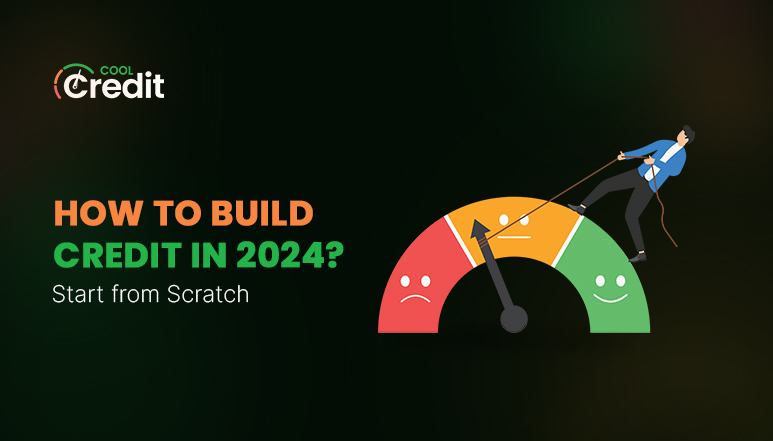
How to Build Credit in 2024? Start from Scratch
Planning to build credit is a choice that can strengthen your financial status in many ways. However, the possibility of getting loans or credit cards is very slim if you don’t have a credit history. That’s why it is tricky to build credit in the early stages. You might think about how to build credit if you can’t get a credit card or a loan. Most beginners feel stuck because of this tricky situation.
Lucky for you, there are multiple ways that can help you with building credit. In this blog, you understand methods that can build your credit score and how it is calculated. You’ll also learn good habits that can keep your credit in the right lane.
Unlock AI Credit Repair Solutions— Fix Your Credit Fast!
Download the AppHow to Build Credit: Methods that Can Help
Building credit is a delicate process and you have to go through a series of steps to reach your desired score. You can follow these methods to build credit from scratch.
1. Secured Credit Card
You can start your credit score-building journey with a secured credit card. Initially, you might not get a credit card because of a low or no credit score. Of course, it makes things tough for you. That’s why you have to take control and get a secured credit card backed by your cash deposit.
Your credit limit on this card will be similar to your cash deposit, and your options for minimum and maximum amounts can be different depending on the card. In some cases, you have to deposit at least $200.
A secured credit card works like regular credit cards. If you pay your balance on time then there will be no interest. Also, you can collect your deposit back once you close your account.
You don’t have to use your secured credit card forever. After using this card, you may qualify for an unsecured credit card. Ensure the secured credit card you choose reports payment data to Equifax, Experian, and TransUnion. This data is key for building credit scores and will be added to your credit reports. Also, try to find a secured credit card with a low annual fee.
2. Credit-Builder Secured Loan
Credit-builder loans can be the right option if you don’t have any credit. You can build credit history and savings with this loan.
In traditional loans, you get your requested amount upfront and return it in monthly installments. However, this is not the case with credit-builder loans, as their sole purpose is to build credit scores and savings. If you take a credit-builder loan, then the lender holds your borrowed amount in a savings or certificate of deposit account. This borrowed amount is not released until you repay the entire amount.
Your lender will report all of the payments to major credit bureaus, helping you build credit. Also, you will receive your lump sum after the deduction of interest and fees.
3. Request for Becoming an Authorized User
Seeking help from family members and trusted individuals can be a good way for you to build your credit. It works like a piggyback ride on someone else’s credit account. Your trusted individuals can make you an authorized user and you can use it for building credit.
Make sure you choose a person who has a positive history of making timely payments. The primary user should also maintain a low credit utilization ratio. These aspects are positive indicators that can build your credit score.
Conversely, a credit account with a high credit utilization ratio and poor payment history can negatively impact your credit score.
| Important Note: Check if the primary user’s credit card company reports authorized users to major credit bureaus. Some companies don’t report authorized users, so it is important you check the lender's policy. |
4. Go for a Personal Loan
You can apply for a personal loan as it helps with building a credit score. A personal loan can improve your credit mix–a vital part of your overall credit score. It can help lenders understand that you are capable of handling various types of credit.
If you pay your personal loan on-time then it can strengthen your payments history. However, you should be aware of the pros and cons of taking a personal loan. Try not to take a personal loan with the purpose of building a credit score. If possible use it for paying off high interest debt or handling important costly expenses.
5. Build Credit with Rent and Utility Payments
A rent report service can help you build your credit score. These services can report your rent and utility payments to major credit bureaus. You can sign up for these services if you pay your full rent on time.
These reported payments can impact your FICO 9 and 10 scores. If you seek a credit from financial institutions that use these FICO models then it can improve your chances of approval. However, these are not the widely used FICO models.
You can follow the same way to report your utility payments. These reported payments can help you build a positive on-time payment history.
How Is Your Credit Score Calculated?
Most lenders use FICO scores–more than 90%. FICO score is a unique blend of payment history, credit mix, and more. Let’s explore how it is calculated:
- Payment History: Your positive on-time payment history makes up 35% of your credit score. Payment history is one of the major parts of your credit score, and you have total control over it. Just ensure you pay your accounts on time during the credit period.
- Amounts Owed: Another major factor that makes up 30% of your credit score and deals with the total amount of debt you carry. This factor is a bit tricky to understand as your credit utilization ratio(Revolving credit divided by revolving credit limit) is more impactful compared to owed debt. If you use a maximum or high percentage of credit limit then it can hurt your credit score.
- Length of Credit History: Keeping your credit or loan accounts open for a long time can improve your score. Length of credit history accounts for 15% of your credit score and tells you to take your time to pay off your credit. That’s why if you close your credit accounts early, your score can be hurt.
- Credit Mix: If you have multiple credit accounts then it is good news for you as it can help you increase your score. 10% of your score depends on the credit mix. Having different accounts shows lenders that you can manage a variety of credit responsibly. However, it might be difficult for you to create a credit mix in early stages.
- New Credit: You should not make the mistake of creating too many new credit accounts especially if you are in the early building stages with a shorter credit history. This unique factor makes up 10% of your credit score.
Elevate Your Credit Score— Fix Your Credit Fast!
Improve credit ScoreHow to Build a Credit Score from Ground Level
Building credit might feel like a tough job but with the right approach you can take it up from the ground level. If you manage to get your hands on any credit product then you can start seeing results in six months.
You’ll be surprised to know that building credit from ground level is faster compared to rebuilding bad credit. However, it all depends on your personal financial situation. Rebuilding crediting is tough, as negative remarks like late payments and bankruptcies can stick to your credit report for seven years. Also, there is no way to remove these correct negative remarks from your reports.
| Note: Seek professional help! You should ensure that you don’t make any mistakes while working on your credit score. Remember, it is work that demands time and patience. |
How to Establish Credit with Good Habits?
Building credit takes time, and you have to be patient in order to acquire a good score. If you develop good habits of paying on time and managing your credit, then you can reach the desired number. You should try developing these habits to establish good credit:
- Always try to Pay on time: Paying your credit or loan payments on time is the best way to improve your credit score. However, you might face situations where paying the full amount is not possible. In these situations, make sure you pay at least a minimum or more than that to keep your score stable.
- Set up Automatic Payments: If you set autopay to make your recurring credit payments, then you won’t miss any payments. Even if you forget about a payment, the amount will be paid on time. However, you have to make sure that you keep a sufficient amount of money in your bank account.
- Maintain Your Credit Utilization Ratio: Try not to use your credit card to the maximum limit; otherwise, it will hurt your credit utilization ratio. Eventually, it can damage your credit score. Conversely, lower utilization can improve credit scores.
- Don’t apply for too Many Cards: You might see a temporary drop in your score if you apply for multiple credit cards. Try researching before applying for a credit card and find one that matches your needs.
- Keep Your Credit Accounts Open: Your open credit accounts impact the length of your credit history. That’s why you should close your credit accounts only for valid reasons such as high annual fees or no additional benefits. If you close a credit account it can also hurt your credit utilization ratio.
Boost Your Credit with CoolCredit
Starting your credit journey might be easy, but the real job is to track and boost your score. A better score can help you get good interest-rate deals and cards with unique benefits. To keep everything in line, you can use apps like CoolCredit. It can help you track your score and get access to reports from Experian, TransUnion, and Equifax.
You can also receive automated alerts for changes in your credit reports. Plus, you can make online payments with flexible payment plans. This way, you won’t miss any payments and consistently improve your credit score.
Conclusion
Getting things started from scratch might be overwhelming for you. But with the right approach, you can build your credit and seek better financial opportunities. You can take assistance from credit repair app to boost your credit score as well. It can ensure that you keep track of your credit score the right way. This way, you can see consistent growth in your credit score and streamline your finances.
FAQs
Q: How Can I Build My Credit?
A: Taking a credit-builder loan, getting your rent and utilities payments reported, and becoming an authorized user are a few ways to build your credit. These methods work well if you’re trying to build credit from scratch.
Q: How Can I Improve Credit Score with Negative Remarks?
A: Negative remarks can stick to your credit reports for seven long years if they are correct. However, you can get them deleted if they are inaccurate. Also, try developing good habits like making timely payments.
Q: Is Building Credit from Scratch Easy?
A: Building credit from scratch can be tricky. However, it is easier to build credit from the ground level compared to rebuilding one.
Q: How Can I Build My Credit Fast?
A: It can take up to six months to build credit from scratch. It is a process that demands patience and long-term efforts.





